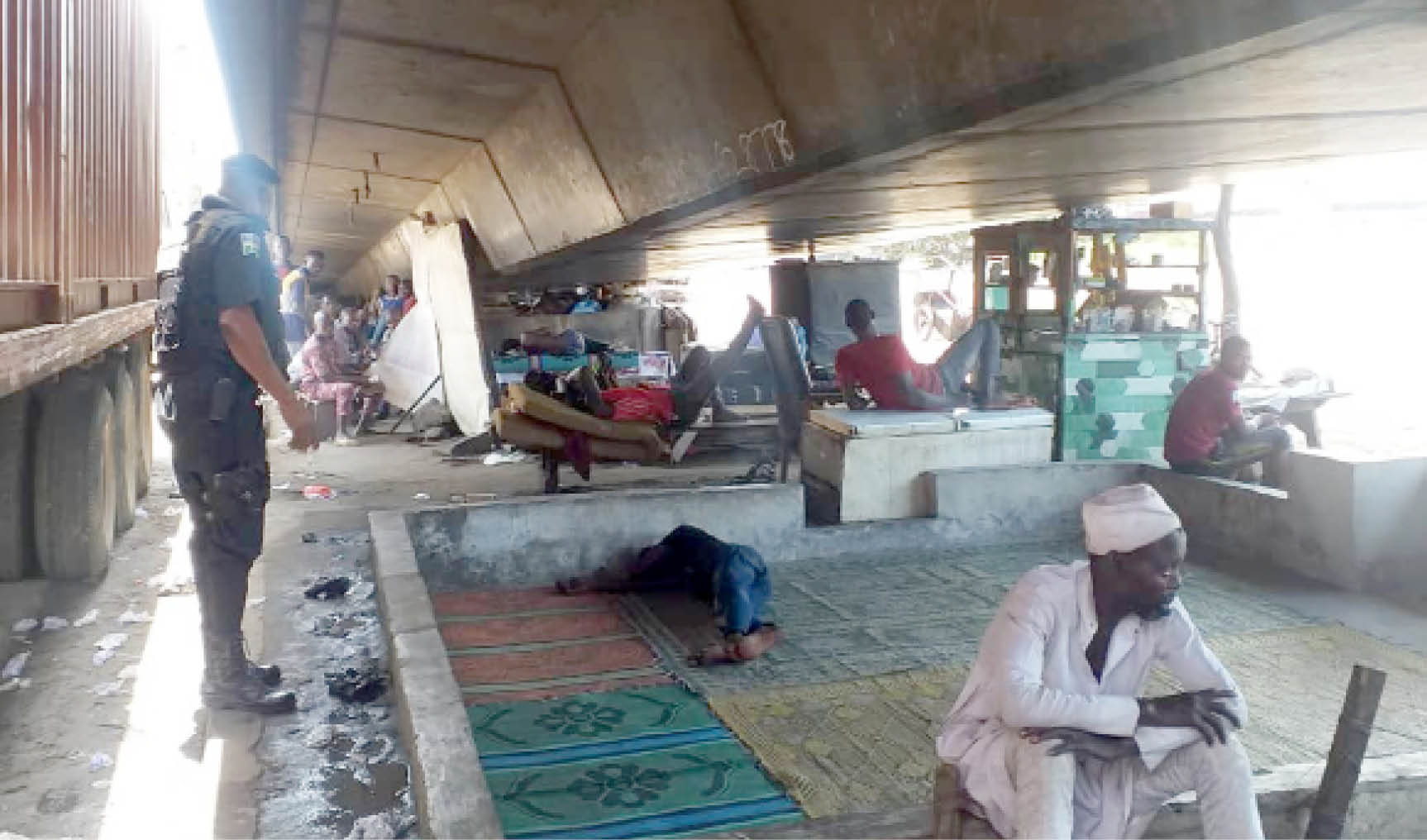The world of under-bridge dwellers in Lagos comes in many facets. Some of them fled from insurgency in the North East, banditry in the North West, joblessness in the South East and other uncomfortable places in search of comfort, particularly greener pastures in the commercial nerve centres of the country, Lagos. Daily Trust takes a look at the exotic lifestyles of residents who live under-the-bridge in Lagos.
Without a support system, they find solace under some overhead bridges in Lagos.
Even, people that could be classified as rich are among the squatters – Those who can afford some basic luxuries such as refrigerators, generators, televisions.
Scores of those who reside under different bridges have one specific business or the other.
Some of them are into cart pushing. They are known as “bola boys.” But a good number of them deal in scraps and other recycling items. Some of them work with commercial buses as conductors. Others ride commercial motorcycles popularly known as okada, while a good number of them act as porters in the cluster of markets in highly commercial areas.
Many of the male folks beg for alms, while girls serve as helps to roadside food vendors also referred to as ‘bukas’ or canteens.
Some of the under-the-bridge dwellers cluster around roads leading to markets in highly commercial areas like Oshodi, Ojota, Idumota and Ijora areas. In these places, the settlement pattern depends on the kind of business that goes on there. Majority of those who cluster around the bridge at Ketu-Mile 12 and Ojota are into hawking of foodstuffs, while those around Ijora and Costain sell petroleum products. Unlike Ijora and Ketu-Mile 12, under- -the-bridge residents at Mile 2 and Maza Maza areas are from the Eastern states. They work as porters with different transport companies in the area.
The cart pushers or bola boys go to the towns in the morning. They move from one refuse dump to another scavenging for scrap metals to sell to dealers that live comfortable lifestyles under the bridge.

It is not all under-the-bridge residents in Lagos that can be classified as poor. Investigations by Daily Trust has shown that some of them live luxurious lifestyles and boast of assets in excess of millions of naira in their ‘apartments.’
They furnish their rooms with tasty pieces of furniture, television sets with DSTV and air-conditioners.
This class of dwellers are regarded as the high and mighty in the areas. They are lords over others as they call the shots. They are the big-time dealers who buy anything sellable from the squatters. Cart pushers and hawkers gather in front of their apartments in the evenings to watch movies. Everybody knows everybody such that if one regular is not seen, others would begin to ask questions.
The under-the-bridge residents face different experiences based on diverse circumstances.
While some encounter bitterness and regret the ‘abode,’ others rejoice for the good things that life offers them at the place.
I lost over N5m asset to demolition
There are small rooms built with corrugated iron sheets under the bridge at Ijora. Some of them are used as chalets. They are rented out to travellers, particularly truck drivers or those with a female companion.
Ibrahim Baba-Ahmed, who sells adulterated or used engine oil, told our correspondent that he moved to Ijora about 10 years ago.
“When I moved in, I started helping my elder brother, Sule, to sell engine oil and diesel. He buys from tanker drivers who come from the North to load products from any of the tank farms in Apapa. While I was with my brother, I noticed that some people were scooping black oil from drainages at Ijora. I joined them and later started my own business from the proceeds I made,” he said.
“At times, we got raided by policemen who would come at weekends to collect their usual money known as ‘Roger from us.’ I was arrested several times, but my brother always came to secure my release.
“I reside in one of the rooms under the bridge in Ijora. That was before the state government came to demolish all structures under the bridge. I lost goods and cash worth over N5 million. I am trying to pick up the bits and pieces of my life,” he said.
Another Ijora under bridge occupant, Hussaina Ibrahim, 38, who hails from Taraba State but speaks Yoruba fluently, said that she moved to the area when she was about 20 years.

According to her, she sells nunu during the day but joins other fun seekers at nights.
“I had my first child for one of the occupants here 17 years ago. I met him while hawking nono. When we met, he promised to marry me. But I never knew it was a ploy to lure me to his bed. His one room apartment by the rail line was well furnished. He was every young lady’s dream. He drove me away and moved on to another girl when he knew that I was pregnant. Many of the girls here go into prostitution to make ends meet. Different kinds of people live under the bridge. The good, the bad and the ugly,” she added.
Most of the dwellers at Ijora under bridge around the National Theatre have since relocated to Orile area by the trailer park after the destruction of what was once their home and business place.
Pay as you go toilet
Whenever it rains, the environment reeks with stench from decayed fruits and open drainages as well as the wooden bridge side toilets.
The toilet is referred to as pay as you go. Kazeem Kolawole, who is in charge of one of the toilets said it was built by one of their leaders.
“Those who come to use the facility have to pay N100 to defecate. We have a small bathroom by the side of the toilets for those who may wish to take their bath before they go out in the morning or at night,” he said.
Our correspondent also gathered that illicit drugs of all kinds are sold. During the day, boys and girls of easy virtues hang around Indian hemp smoking joints, which the dwellers refer to as bunk. Only the rugged ones dare to sleep at the different bunks.
“One can only be allowed to sleep on a wooden bench if one is known to the owners,” Kolawole said.

Living here is not entirely rent-free as newcomers are billed by the older occupants before a space is earmarked for them. According to Kolawole, the rate differs but it is usually between N10,000 and N15,000 per annum, while those who want to erect a kiosk to trade are billed additional money.
Illegal connection of electricity is the order of the day in the neighbourhood as the ‘residents’ don’t pay for the service.
“Who is going to bring bills here? Some places are still lucky to be able to tap electricity but some are not fortunate with the advent of prepaid meters and solar-powered street lights. However, a good number of us have our generators,” he said.
Most of the dwellers also spend their money gambling by playing Lotto, popularly known as Baba Ijebu.
One of the older squatters at the Ijora Under Bridge, Abdullahi Usman, said under bridge communities harbour people from various ethnic groups in the country. It is the only means of avoiding the high cost of rent in Lagos State.
He said they move to another bridge as soon as the one they are living in is destroyed while keeping in touch with their customers and friends.

 Join Daily Trust WhatsApp Community For Quick Access To News and Happenings Around You.
Join Daily Trust WhatsApp Community For Quick Access To News and Happenings Around You.


